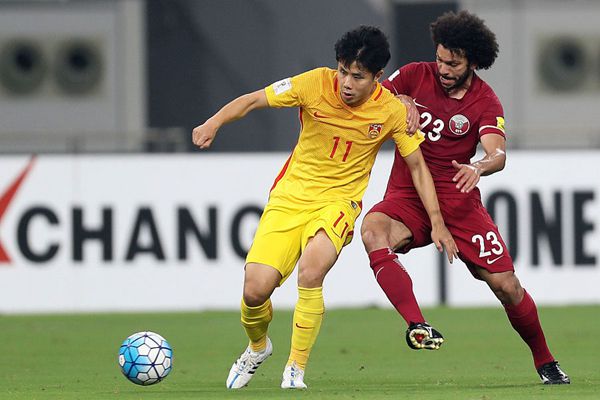Smoother road ahead on horizon
 0 Comment(s)
0 Comment(s) Print
Print E-mail China Daily, September 7, 2017
E-mail China Daily, September 7, 2017
 |
|
China's Hao Junmin (L) and Qatar's Ahmed Mohamed el-Sayad fight for the ball during the FIFA World Cup 2018 qualification match between Qatar and China at the Jassim Bin Hamed Stadium in Doha on Sept 5, 2017. |
China's dream of World Cup qualification has once again been dashed, but the nation's pursuit of a soccer renaissance is headed in the right direction, with beefed-up initiatives for youth promotion and league development.
Team China's hard-fought 2-1 win over Qatar in Tuesday's final Asian qualifier for next year's World Cup provided a booster shot for long-suffering fans, but the pain of failing to advance to the marquee tournament for the fourth time in 15 years quickly triggered a nationwide lament as the hashtag #2018 World Cup journey ends# on Sina Weibo attracted an astounding 2 billion views within hours.
During a post-match interview with CCTV, Team China captain Zheng Zhi tried to remain upbeat while breaking down the 80th-minute penalty he converted to secure the win - but his deep sighs and knitted brow betrayed him.
"So much regret," said the 37-year-old. "We've come so close by giving all the effort we could. The result was anticipated ... but the disappointment hits hard.
"Still, we have grown as a team throughout the qualifying journey. I hope the experience will inspire the younger generation to keep working hard to go further in the future."
Hundreds of Chinese fans that traveled to Qatar stayed inside Khalifa Stadium long after the match, flying red flags in support of their heroes.
"Missing out on yet another World Cup final still hurts, but to advance to the final Asian qualifying round and still be mathematically alive until the last match has proven that the current team did its best. We don't blame them," said Wang Qi, chairman of a Beijing-based fan club.
Team China head coach Marcello Lippi, who took the reins last October after the squad accumulated just one point after four matches in the final qualifying round, guided them to 11 points in the following six contests, prompting assumption that an earlier appointment might have gained a more favorable result.
The Italian guru, who guided Italy to the World Cup in 2006, said he cares more about progress than results.
"When I was appointed, I was asked to build a strong team, not to guarantee a World Cup entry. We made good progress; we were just unlucky to get the result we deserved," said Lippi, who helmed Cantonese club Guangzhou Evergrande to one Asian and three domestic titles from 2012-15.
Cai Zhenhua, president of the Chinese Football Association, has voiced his support for Lippi and his staff to continue to help develop a solid national program from youth to adult teams.
"The resilience, determination and fighting spirit shown by the team under Lippi was inspiring. We highly appreciate his work and that of his staff and we look forward to a bright future," the CFA said in a statement released on Wednesday.
But to realize the government's ambition of developing the country into a world soccer power by 2050 will require much more than just hiring world-class coaches as pundits call for greater efforts in youth development and the rational operation of domestic leagues.
Tan Jianxiang, a sports sociology professor at South China Normal University, said the governing body and relevant departments should keep investing in grassroots participation, infrastructures and training of local coaches - regardless of results at the elite level.
"The magic of even the best, most expensive coaches in the world can't work if we don't have enough talent. The most urgent task is to keep improving facilities and training for youth without setting eyes on any instant results at major events," Tan said.
Highlighted by a national soccer reform plan issued by the State Council in early 2015, the country aims to introduce soccer training at 20,000 schools, up from more than 13,000 currently, and build 60,000 new pitches by 2020.
Former national midfielder Ma Mingyu, a key contributor on the 2002 World Cup team, said professional clubs, local education authorities and sports bureaus should coordinate efforts to offer technical and financial support to junior coaching programs.
"The shortage of qualified trainers and the high cost of venues remain major issues," said Ma, now deputy secretary general of Sichuan Provincial Football Association.
At the elite level, the CFA is limiting the use of foreigner players to curb rampant spending by cash-rich Chinese Super League.
Starting from the 2018 season, the number of U23 local players each CSL and second-tier league clubs field in any match at any time cannot be less than the number of foreign players used.
As well, every team must register at least three U23 players on its 18-man match roster and start at least one of them, according to the rule updated in June.






Go to Forum >>0 Comment(s)